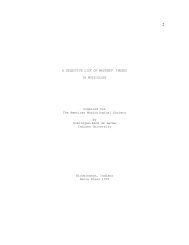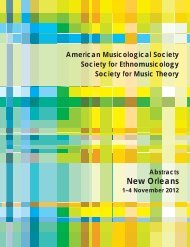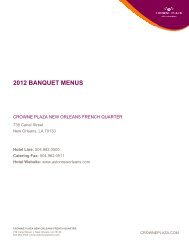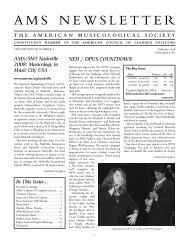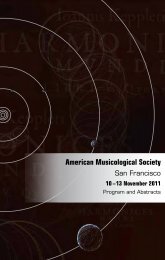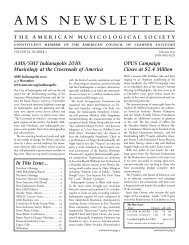AMS Philadelphia 2009 Abstracts - American Musicological Society
AMS Philadelphia 2009 Abstracts - American Musicological Society
AMS Philadelphia 2009 Abstracts - American Musicological Society
You also want an ePaper? Increase the reach of your titles
YUMPU automatically turns print PDFs into web optimized ePapers that Google loves.
112 saturday morning <strong>AMS</strong> <strong>Philadelphia</strong> <strong>2009</strong><br />
DisPlAceMents<br />
lydia goehr, columbia university, chair<br />
“ALLONS EN PAIX, REBATIR NOS MAISONS”:<br />
STAGING THE réFUgié EXPERIENCE<br />
Rebekah Ahrendt<br />
University of California, Berkeley<br />
In 1707, impresario, novelist, and spy Jean-Jacques Quesnot de la Chênée produced livrets<br />
for two operatic works: La Bataille de Hoogstet, tragédie en musique and La Bataille de ramelie<br />
ou Les glorieuses conquests des Alliez, pastorale heroique. He dedicated them to the burgomasters<br />
of Amsterdam and Rotterdam, respectively, in a last desperate attempt to succeed on the operatic<br />
stage after a career full of misadventures. Both works laud Grand Alliance victories, but<br />
from a particular perspective—that of a French Protestant exile.<br />
The Battle of Blenheim (13 August 1704) was Marlborough’s first victory, and that of Ramillies<br />
(23 May 1706) was his greatest; together they resulted in the most significant French<br />
defeats of the War of the Spanish Succession. Louis XIV lost many of his territorial gains, and<br />
Maximilian II Emanuel was ousted from both Bavaria and the Southern Netherlands. Regime<br />
change had come.<br />
The new order significantly impacted one group of civilians—Huguenot refugees. Maximilian<br />
II Emanuel’s alliance with Louis XIV had made life very difficult for Huguenots.<br />
Quesnot, then resident in the Southern Netherlands, was especially sensitive to this. Although<br />
his onstage battles are part of a long spectacular tradition, they are perhaps the only celebrations<br />
of Allied victories in French. Furthermore, rather than reinforcing the political status<br />
quo, these works advocate the embrace of a new political regime.<br />
One of the most striking things about these works is their representation of civilians. In La<br />
Bataille de Hoogstet, the peoples of Swabia are portrayed as emblems of fear, stylized victims<br />
ready for rescue by the benevolent Marlborough, whose advent is heralded by Queen Anne<br />
herself. In La Bataille de ramelie, the inhabitants of the Southern Netherlands are depicted in<br />
the pastoral mode as shepherds, rustics, and drunks, yet their houses have been burned and<br />
their lands ruined by “forageurs.” Quesnot’s explicit representation of the civilian plight, as<br />
well as his invocation of a sort of fantasy island where the “bergers fugitifs et refugiés” will be<br />
able to rebuild their homes, speaks not only to his own refugee experience, but to the importance<br />
of communicating it to audiences far removed from the battlefield.<br />
No music survives for these works—or does it? These operatic battles seem to display more<br />
of an affinity with the Dutch oorlogspel or German occasional works than with French opera,<br />
as might be expected considering the intended audience. However, as I demonstrate,<br />
Quesnot’s generic designations and prefaces not only create a certain set of expectations for<br />
his readers, but also provide clues as to his source materials. It seems that these works are based<br />
on parodies of famous airs from French opera.<br />
Utilizing a number of archival documents and early prints heretofore unstudied, this paper<br />
brings to light an alternate world of French operatic performance, one that catered to those<br />
displaced whether by choice or by force and that demonstrates the repurposing of Lullian<br />
operatic conventions in a framework opposed to absolute monarchy.



